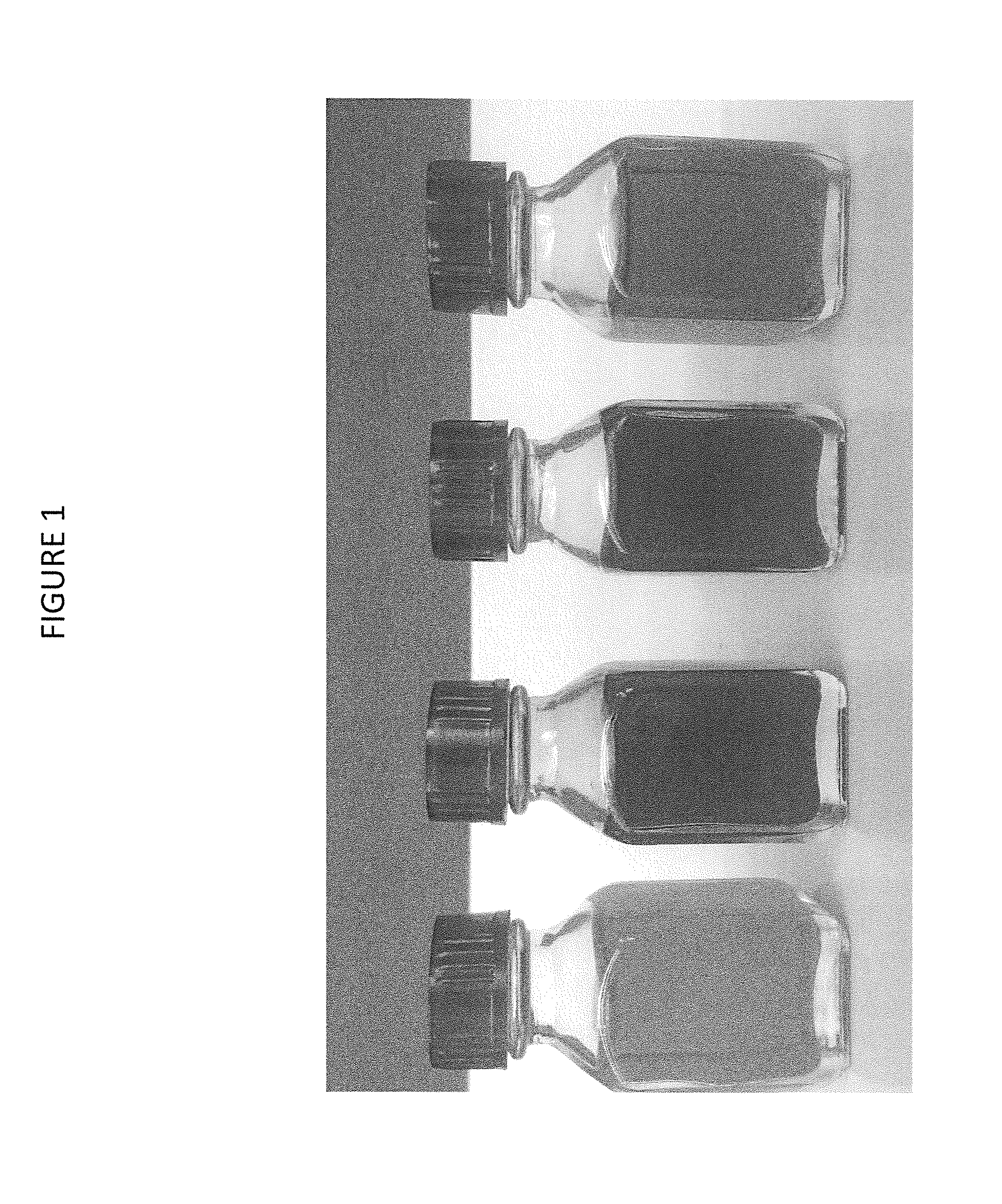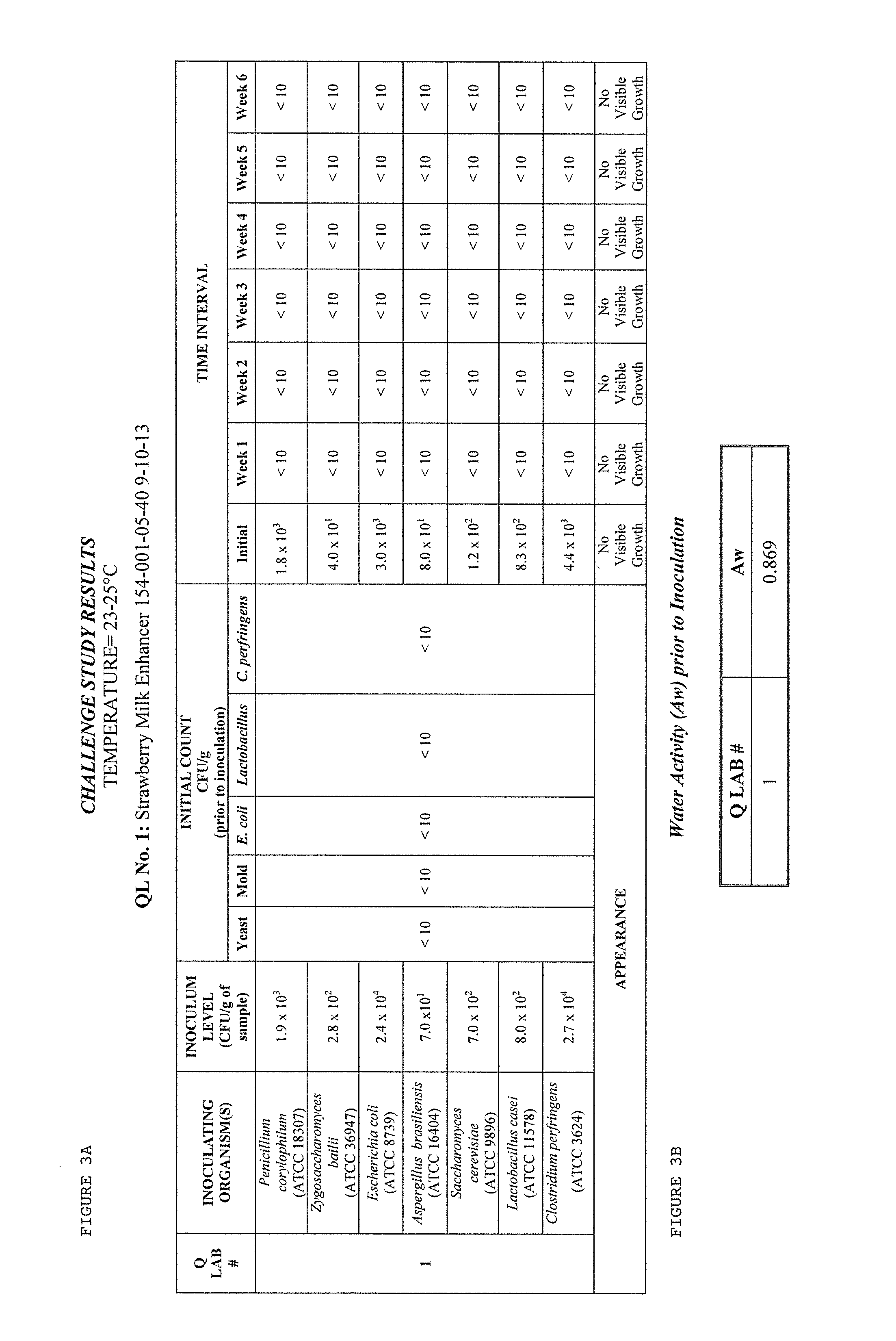Shelf-stable, preservative-free liquid beverage enhancer products
a technology shelf-stable, preservative-free, applied in the field of liquid beverage enhancer, can solve the problems of unpleasant consumer experience, uneven flavor and color distribution, and the typical liquid water enhancer product may not work in beverages other than water, so as to enhance milk, enhance beverage flavor and color, and enhance beverag
- Summary
- Abstract
- Description
- Claims
- Application Information
AI Technical Summary
Benefits of technology
Problems solved by technology
Method used
Image
Examples
example 1
[0046]The following are sample formulations.
[0047]All example formulations are made using the following processing instructions: Dissolve dry ingredients in water (Sugar, Citric Acid, Acesulfame Potassium, Sucralose, Sodium Citrate). Check to ensure all solids are dissolved. Add propylene glycol, glycerol and / or other solvents / humectants and mix well. Add flavor and color and mix well.
[0048]A Liquid Beverage Enhancer meant to deliver a lemongrass mint tea flavor and color that can be labeled as “natural” is shown in TABLE 3. This natural product is made by addition of glycerol and has a low water activity (aw=0.848).
TABLE 3Lemonarass Mint Natural Green Tea% Range w / wCitric Acid0-20%Sugar_Cane0-40%Potassium citrate0-10%Stevia Leaf Extract0-5% Green Tea Extract and Aroma0-50%Caramel Color0-30%Glycerol15-40% Natural Flavor0-20%Water10-50%
[0049]An All-Natural Milk Enhancer which can be added into milk without causing curdling is shown in TABLE 4. This product has a pH above 5.0 and is ...
example 2
[0054]The amount of propylene glycol (or other suitable solvent i.e. glycerol) is a critical aspect of controlling water activity in these Liquid Beverage Enhancer products. Ideally, the water activity should be below 0.85, although it is possible that a Liquid Beverage Enhancer product can be commercially shelf-stable at a water activity slightly above 0.85. The exact water activity to deliver shelf-stability is dependent on formulation, ingredients, package and process conditions.
[0055]In order to find a correlation between % w / w PG and water activity, increasing amounts of propylene glycol were added to a base product formulation. The water activity results are shown below in TABLE 9. FIGS. 5A-5B show the correlation determined between water activity, % w / w PG, and % w / w water.
TABLE 9Sample% w / w% w / w PropyleneNumberWaterGlycolawTemp (° F.)Sample #153.831.60.84620.84Sample #249.336.20.81720.87Sample #344.740.80.79020.81Sample #440.145.40.75820.81Sample #535.650.00.72320.85
example 3
[0056]TABLE 10 shows aerobic plate counts, water activity, and yeast and mold counts for Liquid Beverage Enhancer products produced in a 100 gallon trial batch. The data in TABLE 10 is from samples from this batch that were sent for micro and water activity testing immediately after production
TABLE 10YEAST ANDAEROBIC PLATEMOLD (ISO-PRODUCTCOUNT (FDA / BAM)WATERGRIND)DESCRIPTION(CFU / G)ACTIVITY(count / mL)Strawberry0.822 at 21.62° C.Chocolate0.757 at 21.58° C.
[0057]Samples from this same 100 gallon trial were stored at 100° F. for one month. These samples were then sent for micro testing with the results shown in TABLE 11. There are two data points listed for the strawberry formulation. One bottle of the strawberry product was opened and exposed to air once per week to simulate use after purchase by a consumer. The other bottle was unopened during the 1 month storage at 100° F. The chocolate sample was pulled from an unopened bottle. This data is further proof that these products are comm...
PUM
| Property | Measurement | Unit |
|---|---|---|
| pH | aaaaa | aaaaa |
| pH | aaaaa | aaaaa |
| pH | aaaaa | aaaaa |
Abstract
Description
Claims
Application Information
 Login to View More
Login to View More - R&D
- Intellectual Property
- Life Sciences
- Materials
- Tech Scout
- Unparalleled Data Quality
- Higher Quality Content
- 60% Fewer Hallucinations
Browse by: Latest US Patents, China's latest patents, Technical Efficacy Thesaurus, Application Domain, Technology Topic, Popular Technical Reports.
© 2025 PatSnap. All rights reserved.Legal|Privacy policy|Modern Slavery Act Transparency Statement|Sitemap|About US| Contact US: help@patsnap.com



